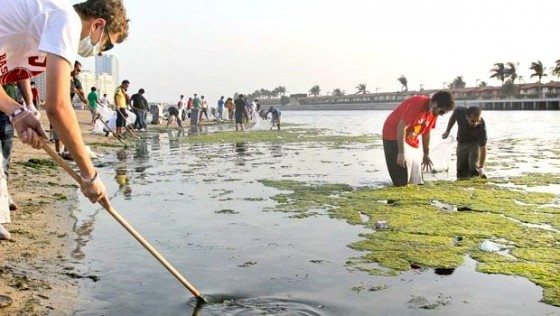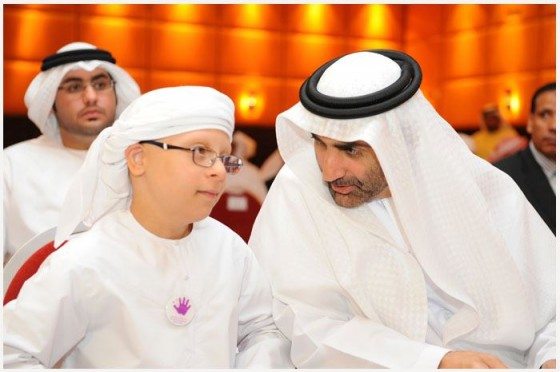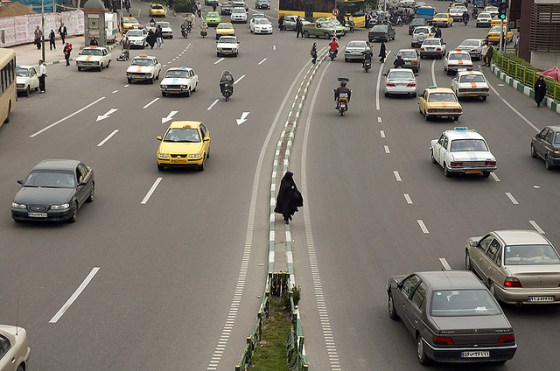Greening society
Speaking to the Green Prophet

Green Prophet is the first and only platform that covers green issues in the Middle East. Through a team of contributors from across the region, Green Prophet reports about clean technology, politics, transportation, health, urban life and much more. Mashallah News spoke to the project’s managing editor Tafline Laylin about challenges and possibilities, and why the Arab Spring is also a green revolution.
Tell us about Green Prophet. How was it born?
The project was started by Karin Kloosterman, who moved from Canada to the Middle East. She realised how far behind the region was environmentally, so she started the blog as a grassroots means of connecting people who had already started moving in a greener direction. Since then, it has continued to grow. We are essentially trying to prevent countries here from making those mistakes that the West made, and instead harness their own green practices.
If you type “environmental issues Middle East” in your search engine, the shortage of information is enormous.
So you function as a bridge between people and different green initiatives?
To some extent, yes. Like a bridge within the region, one that surpasses politico-religious issues. The thing is, if you type “environmental issues Middle East” in your search engine, the shortage of information is enormous. When we started Green Prophet, it became sort of a community. And this is something that we try to harness.
The community, is it mainly online or offline as well?
Online mostly, although we are starting to build a bigger physical presence. That is the direction we are heading in now. Our team is made up of people from the region as well as those who have connections to it but are somehow separated from the place. One of our writers is the child of Palestinian refugees. She was educated in the UK and it makes sense for her to stay there, but she has deep ties to the Middle East.

Are your readers also spread across the world? And many with ties to the Middle East?
Yes. We have many Muslim readers in places like Malaysia, USA, and Europe. Green Prophet is a place where this group can explore environmental issues through the regional religious context, which is ground-breaking in a way. Then, we are also the go-to place for some UNEP folks, journalists, and cleantech people.
People are interested in understanding what direction to move in next.
Your readership is quite diverse, as is the region. What in your coverage do people connect to most?
Cleantech issues always get a lot of views, and those about innovations addressing our unique problems. Stories that address large scale projects like solar farms, bio-fuel projects. These kinds of things. People are interested in understanding what direction to move in next.
The biggest concerns are water, the lack of arable land, pollution and the need for creating a non-fossil fuel infrastructure.
So a lot about forward-looking, innovative things?
Yes, although we also do well with our coverage of people. Individuals who are breaking out of the status quo in a way that garners respect. The Green Sheikh is the best example of that. He is a royalty, from Ajman in the UAE, but he subscribes to none of the usual fanfare. He is very down to earth: does not want to own 12 cars, takes short showers. He is really great. He does a monthly column for us now.

You mentioned our unique problems in the region. Which are these?
Well, here is a good one: in the West, biking is typically seen as a good alternative to cars, and good for the health too. But this is not always a good solution in the Middle East. In the summer, it is almost impossible in some parts of the region to jump on a bicycle. So we have to find solutions that work within our context. And all solutions will have to deal with religion and politics, there is no getting around that.
I feel like awareness is growing. I see so many new green initiatives popping up all the time.
But the biggest concerns are water, the lack of arable land, pollution and the need for creating a non-fossil fuel infrastructure. For these, we cannot import solutions. We need home-grown ones.
What about awareness? It seems that the global awareness of climate change peaked a few years ago, and now since the financial crisis hit, it is not reported about anymore.
Yes and no. I agree that it peaked, but then — although I have to admit that I am turned into a certain sector of society so my view might be slanted — I feel like awareness is growing. I see so many new green initiatives popping up all the time. I get letters every so often from people in Saudi and elsewhere who want to do things. I know of Iranians taking big risks to draw attention to pollution and water degradation in their country. And in some places, like the UAE, we are surpassing countries like the USA.
The Gulf is moving faster than anyone else in the region.
The region is big and diverse. This must reflect in your coverage?
Yes, that is a good point. There are big differences. Iran is way behind when it comes to the environment, as is Iraq, for so many reasons. Jordan is progressing. But the Gulf is moving faster than anyone else in the region.
They know that the oil is running out, and they do not intend to go out with it.
And the Gulf needs to keep up a faster pace, don’t they, with their huge ecological footprint?
Yes, and they know that better than anyone. I truly believe that. We recently did a story about Abu Dhabi shaming the White House by putting solar panels on an important municipal building. A symbolic gesture, highlighting the direction that the city is pursuing. They know that the oil is running out, and they do not intend to go out with it. They need oil to support their economy, so they want to stop using it all up themselves and create an alternative energy infrastructure.

And they are putting lots of resources into educating their young generation.
Yes, the Gulf is in an excellent position. This is one of the few places on earth that has cash flow that can be used to support a shift towards a greener future. Not least educationally.
Capitalism and globalisation rely on having big ships and cars. And oil. The revolutions can change that, by insisting on a more local focus.
On to something completely different: the revolutions. Do you see anything green in them?
Definitely. Food prices was one trigger, which signals an overall mishandling of our natural resources and agriculture. And the current political infrastructure, the one people are revolting against, is built on keeping the existing fossil-fuelled infrastructure intact. Of course, this is a total simplification, because there is more to it than that. But capitalism and globalisation rely on having big ships and cars. And oil. The revolutions can change that, by insisting on a more local focus. A focus on the community. How will people here find jobs and food? These days, the answer comes down to local initiatives and a greening economy.
So the post-revolutionary era brings possibilities?
I believe that, in about five to ten years, going green will not be a side-line conversation, it will be THE conversation. Energy and water conservation, energy efficiency, alternative energy sources — these issues are already very urgent and many people don’t see that. But pretty soon, they will be at the forefront of our consciousness out of necessity.
8 thoughts on “Greening society”
Comments are closed.







Tafline gave a great overview of what Green Prophet is doing, and Jenny a wonderful story. We welcome guest posts, tips, and story ideas for profiles on people, organizations, or just about anything you feel passionately about in the green sphere. Email me anytime: karin@greenprophet.com
Alhamdulilah I am very excited to see the growth
of alternative energies sources being nurtured and utilized in the mid-east. Last year on my Hajj journey I became very ill (near pneumonia like symptoms.)The diesel exhaust level was so high between Mena and Aziziyah where I then suffered what I would call a small heart attack, could not breath as well. I could not continue my Hajj rites until the following night and then in a wheelchair(too I also had a cast on my ankle)InshaAllah the mid east will be fore runners in operating with alternative energies with wind and solar opportunities so abundant.
Thankyou for thinking of our future generations. Salams
Janice Tufte
From my perspective, traveling extensively in the Western Hemisphere side of the planet and talking to folks who no longer look askance at me as I speak “green” is refreshing growth. Green Prophet, Tafline and the staff’s work is to be cherished. Talking and living green must become pro active world wide. Green Prophet is a huge catalyst toward making this a reality. Thank you for the Interview.
You know I never thought of the revolutions in these terms before. But I agree with the analysis that nature and the human condition is related to our consumerist mode of living and it’s us people who get affected by the negative consequences first of all. الشعب يريد اسقاط النظام الاستهلاكي!